- Home
- A-Z Publications
- World Economic and Social Survey (WESS)
World Economic and Social Survey (WESS)
The World Economic and Social Survey (WESS) provides objective analysis of pressing long-term social and economic development issues, and discusses the positive and negative impact of corresponding policies.
This publication is continued by World Social Report.
ISSN (online):
24121509
Frequency:
Annual
Filter :
Sustainable Development Goals
Subject
Publication date
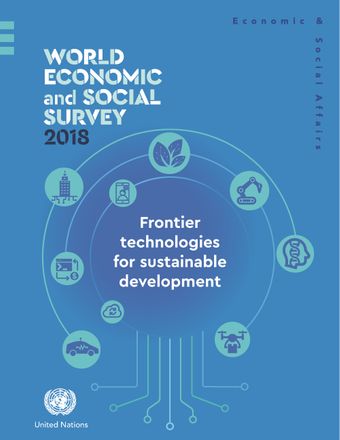
World Economic and Social Survey 2018
Frontier Technologies for Sustainable Development
Oct 2018
Book
This publication reviews the advances in frontier technologies — including automation robotics renewable energy technologies electric vehicles biotechnologies and artificial intelligence — and analyzes their economic social and environmental impact. These technologies present immense potentials for the 2030 Agenda fostering growth prosperity and environmental sustainability. They also pose significant risks of unemployment underemploy Read More
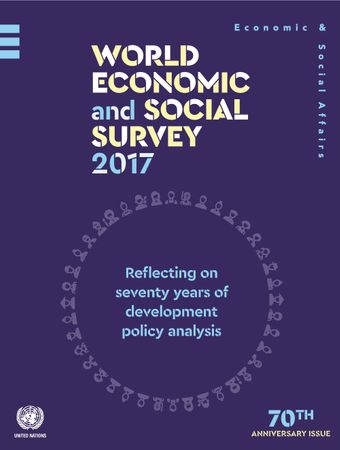
World Economic and Social Survey 2017
Reflecting on Seventy Years of Development Policy Analysis
Jul 2017
Book
The aim of WESS 2017 is to document the intellectual influence of the Department of Economic and Social Affairs (DESA) through its flagship publication World Economic and Social Survey (WESS) on its 70th Anniversary. First published in 1948 the Survey is the oldest continuous post-World War II publication of its kind that records and analyses the performance of the global economy and social development trends as well as offers relevant policy recomm Read More
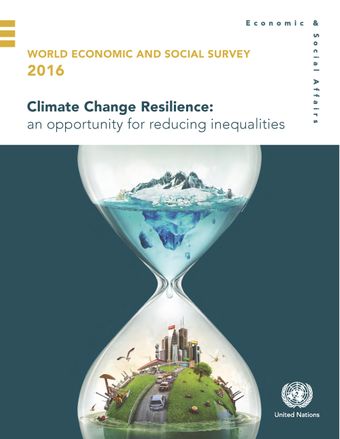
World Economic and Social Survey 2016
Climate Change Resilience - An Opportunity for Reducing Inequalities
Aug 2016
Book
This edition of the World Economic and Social Survey contributes to the debate on the implementation challenges of the 2030 Agenda for Sustainable Development. In addressing the specific challenge of building resilience to climate change the Survey focuses attention on the population groups and communities that are disproportionately affected by climate hazards. It argues that in the absence of transformative policies which coherently ad Read More

World Economic and Social Survey 2014/2015
Learning from National Policies Supporting MDG Implementation
Feb 2016
Book
The year 2015 was one of global action concerning the Millennium Development Goals (MDGs) and other challenges. The 2030 Agenda for Sustainable Development along with a set of new Sustainable Development Goals (SDGs) will apply universally to all countries. As the MDG experience shows setting ambitious goals is the first step; achieving them requires concrete actions. This publication reviews economic social and environmental policies im Read More

World economic and social survey 2013
Sustainable development challenges
Jun 2013
Book
The 2015 deadline to meet the targets of the Millennium Development Goals is fast approaching. There has been significant progress but it is uneven. Meanwhile the context within which development goals are pursued has become much more challenging visible in the recent food fuel and financial crisis. Environmental degradation demographic changes and persistent inequalities further threaten progress. This publication will discuss new directions Read More
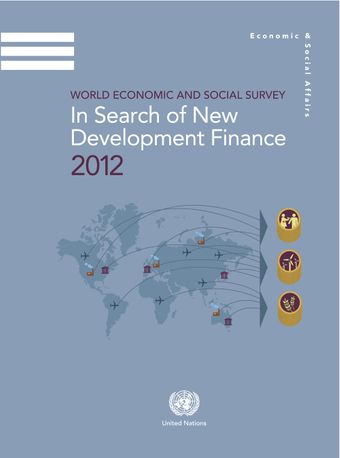
World Economic and Social Survey 2012
In Search of New Development Finance
Jun 2012
Book
The World Economic and Social Survey (WESS) is a yearly publication that provides objective analysis of pressing long-term social and economic development issues and discusses the positive and negative impact of corresponding policies. Scholars policymakers development thinkers and practitioners as well as United Nations staff members have come together to develop the main messages for this year’s focus – Innovative Sources of Development Finan Read More

World Economic and Social Survey 2011
The Great Green Technological Transformation
Jul 2011
Book
This survey explains why the Great Green Technological Transformation will have to be fully realized in developing countries if they are to achieve food security and rural development minimize the damage from natural hazards and extreme disasters partly induced by climate change and transform their economies to beat destitution and create productive jobs. Avoiding the climate change tipping point will require fundamental shifts in existing tech Read More
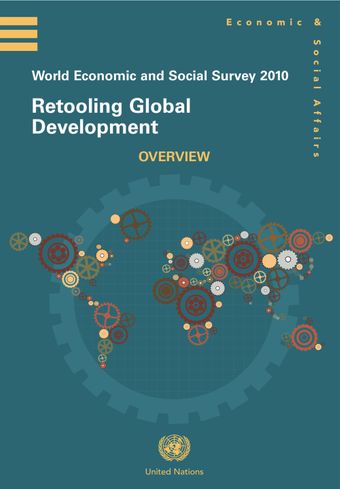
World Economic and Social Survey 2010
Retooling Global Development
Jul 2010
Book
The Survey points out promising directions for reform including strengthening government capacities for formulating and implementing national development strategies; doing more to ensure that official development assistance is aligned with national priorities; strengthening the international trade and financial systems so that countries with limited capabilities can successfully integrate into the global economy; creating new mechanisms for Read More

World Economic and Social Survey 2009
Promoting Development, Saving the Planet
Feb 2009
Book
The separation in practice of climate change and development agendas has distorted the global debate on the two biggest policy challenges facing the international community. According to the Survey an integrated approach based on the concept of sustainable development is urgently needed. It argues that mitigation and adaptation can move forward effectively only if they are part of a consistent development strategy built around a massive inve Read More

World Economic and Social Survey 2008
Overcoming Economic Insecurity
Jul 2008
Book
According to the Survey economic insecurity arises from the exposure of individuals communities and countries to adverse events and from their inability to cope with and recover from the downside losses. Local concerns have been compounded by new global threats as unregulated markets and climate change. The Survey offers a different approach with a strong “social contract” and more integrated and pragmatic economic and social policy. It calls for Read More

World Economic and Social Survey 2007
Development in an Ageing World — 60th Anniversary Edition, 1948-2007
Jun 2007
Book
The World Economic and Social Survey 2007 analyses the challenges and opportunities associated with ageing populations and aims to facilitate discussions in furthering the Madrid International Plan of Action on Ageing which focuses on three sets of priorities: older people and development; advancing health and well-being into old age; and enabling and supportive environments for older persons. The Survey underscores the need to fully recognize and bett Read More

World Economic and Social Survey 2002
Trends and Policies in the World Economy
Oct 2006
Book
Part I. State of the World Economy: In the second half of 2002 the world economy stands at a delicate juncture. After the weakest performance in a decade for the year as a whole global economic recovery is under way. However neither the strength nor the breadth nor the durability of the recovery is assured. Part II. Private-Public Interaction in Achieving Society’s Goals: examines selected aspects of the changing nature of the interaction between the pu Read More
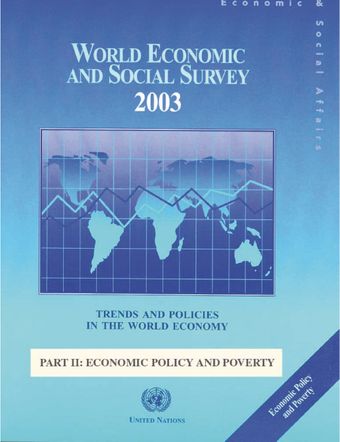
World Economic and Social Survey 2003
Trends and Policies in the World Economy
Oct 2006
Book
The World Economic and Social Survey is the United Nations annual analysis of current developments in the world economy and emerging policy issues. It contains forecast of short-term global and regional economic trends and reviews major developments in international trade. Part One of this year’s Survey revolves around the economic recovery that is underway in some developed market economies and some developing countries. Part Two explores Read More
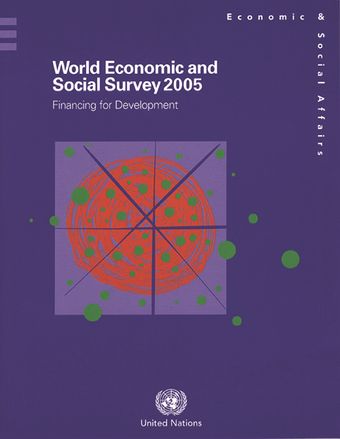
World Economic and Social Survey 2005
Financing for Development
Oct 2006
Book
The World Economic and Social Survey 2005 focuses on the Monterrey Consensus as the current framework for international cooperation for development. The report examines the correspondingly broad agenda for action that was set out in the Consensus recognizing numerous accomplishments to date and draws attention to the further actions—in the financing and trade areas—that need to be undertaken in the years ahead to achieve both the Millen Read More

World Economic and Social Survey 2006
Diverging Growth and Development
Oct 2006
Book
The World Economic and Social Survey provides objective analysis of pressing long-term social and economic development issues and discusses the positive and negative impact of corresponding policies. The analyses are supported by analytical research and data included in the annex. According to the 2006 edition of the Survey in the industrialized world the income level over the last five decades has grown steadily while it has failed to do so in many d Read More

World Economic and Social Survey 2004
Part I — Trends and Policies in the World Economy, Part II — International Migration
Apr 2004
Book
The 2004 edition of the World Economic and Social Survey is divided into two parts. The first part discusses the state of the world economy in 2004 and the outlook for 2005. It includes a review of developments in international trade and finance and an overview of the situation in the world’s economies as of mid-2004 and their prospects for 2005. Meanwhile the second part addresses international migration. It examines historical and recent surges in migr Read More

World Economic and Social Survey 2001
Trends and Policies in the World Economy
Aug 2001
Book
Part one. State of the World Economy: chronicles how the very positive developments in output and international trade with reasonably buoyant levels of international finance for emerging markets for the first half of 2000 turned into retrenchment. The ongoing downturn in the business cycle in developed countries has been unusual in a number of respects when contrasted with previous downturns in the post-war period. Part two. A Globalizing Worl Read More

World Economic and Social Survey 2000
Trends and Policies in the World Economy
Apr 2000
Book
Part one. State of the World Economy: chronicles a remarkable recovery in the world economy after the crisis years 1997-1999. Although the volume of international financial flows has not returned to its pre-crisis level international financial markets are again displaying a sense of calm. International trade has also largely recovered from the setback it suffered following the financial crises. Part two. Escaping the Poverty Trap: identifies a number of critical Read More

World Economic and Social Survey 1999
Trends and Policies in the World Economy
Sep 1999
Book
Part one. State of the World Economy: provides a chronicle of how large parts of the world economy were sent reeling in the past two years by the fragility of financial systems and their international connectedness. On the whole the world economy seems to have hit bottom and most of the affected countries are moving towards recovery. Part two. Financial Development in the Globalizing World: serves as a contribution to the international discussion on “fin Read More
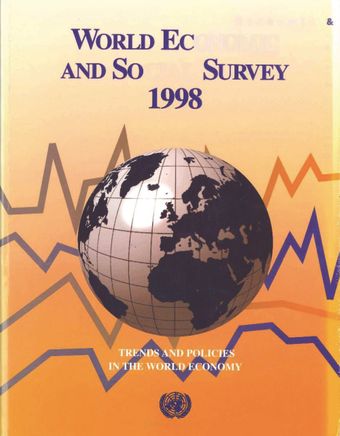
World Economic and Social Survey 1998
Trends and Policies in the World Economy
Jul 1998
Book
Authoritative and reliable the 1998 World Economic and Social Survey offers unique insight and commentary on current trends and policies in the world economy. Its forecasts and lucid descriptions make it an essential tool for those involved in international trade and finance. This new edition provides a comprehensive review of macro-economic developments in 1997 and the outlook for 1998 in developed developing and transition economies. It a Read More
No more items...
